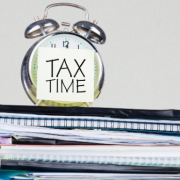The matter of how Tax Agents, particularly tax refund companies has been raised in the media again and the most recent article comes with a warning about how your refund could be paid into their bank account even if you do your own tax return online.
At Savage & Savage we never receive client tax refunds into our account, not even our Trust Account. All client refunds go directly to the client and that is why we ask for your bank account details in our client questionnaire each year. And we most certainly do not take fees from your refund.
It is important you fill in your bank account details on the Client Questionnaire Forms each year as we never assume you haven’t changed bank accounts.
To see the original article as posted by Fairfax Media on their Stuff website click here
The article is copied here;

You might still have to pay a tax refund company a fee – even if you do your return yourself.
Casey Kaumatule thought she was being sensible and saving money when she decided to take matters into her own hands and do her partner’s tax return herself, online.
She opted to do it via the Inland Revenue website rather than paying a tax refund company to handle it.
“We got a good amount that was owed to us. But when I checked, I noticed it was paid to a different bank account. I rang IRD and the tax return money had been sent to Savvy Tax Agents. They did my partner’s tax return before and their account wasn’t removed.”
She spoke to the firm, which agreed to waive the fee it would normally charge to release the money that had been sent to it. Kaumatule said it was her mistake not to have checked the details, but it was still frustrating.
Another woman, Samantha Dallas, was also caught out. She said she was not sure when she had signed up with the tax refund firm, but discovered after she had processed her personal tax statement that they were listed as her tax agents.
“I think all tax should just be done through IRD. We already get taxed and private tax agents make it feel like you are getting taxed on your tax.”
People who sign up to have a tax refund company prepare their tax returns usually agree to have those firms act as their tax agents from then on, with their bank accounts set up to process future refund payments.
That means, even if they do their return themselves in future, the agent can end up with the refund.
Consumer NZ spokeswoman Jessica Wilson said it was something her organisation had received complaints about.
Many companies charge a fee to release tax refunds that have been put in their banks accounts in error.
“Problems arise when people aren’t aware they’re giving the company the authority to act as their tax agent – and it remains so until the arrangement is cancelled,” she said.
“There’s an onus on tax refund companies to keep their customers informed the arrangement is still in place. If a company hasn’t done so and receives the refund as a result of a return the customer has filed, we think it shouldn’t deduct a handling fee.”
NZ Tax Refunds, or WooHoo, charges a $25 handling fee in these circumstances.
Managing director Gabrielle Purchas said her firm would automatically push money back to Inland Revenue when a client had not completed the return within its system.
She said it was an administrative burden for her organisation to have to deal with and was something that could be overlooked. “We send it straight back to IRD if we can see it hasn’t been requested.”
Savvy Tax Agents said it would do the same but would not charge.
An Inland Revenue spokesman said it was clear on its MyIR online service whether a person’s account was linked to a tax agent.
“The best advice would be that if you have used a tax refund company in the past then you should check all your details are correct on MyIR before you start applying for a refund yourself.
“Once the customer has reached the My Tax Agent tab on MyIR, they can see who their tax agent is but to de-link they would need to give us this instruction by phone or through secure mail in MyIR.”
– Stuff





